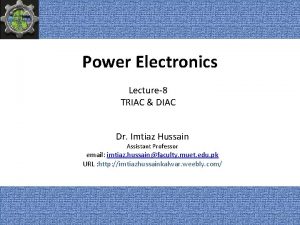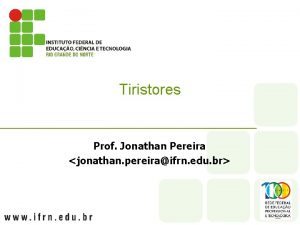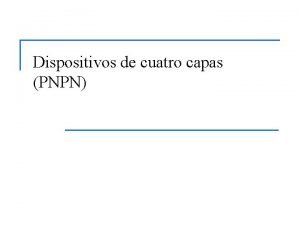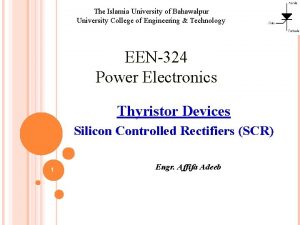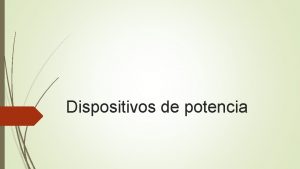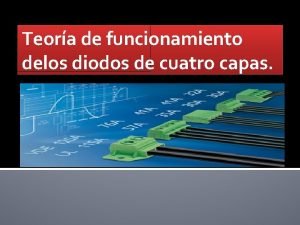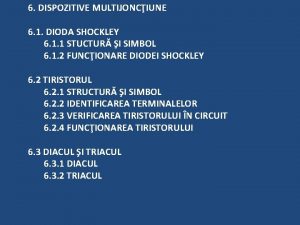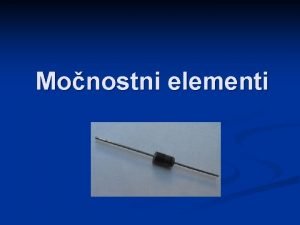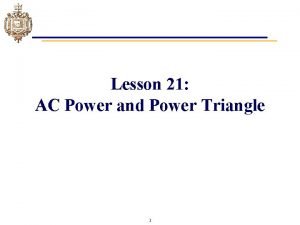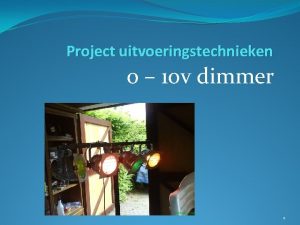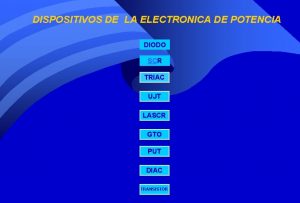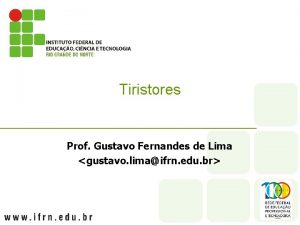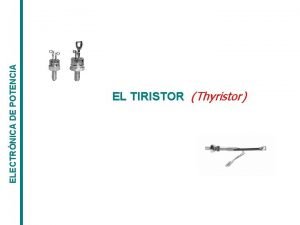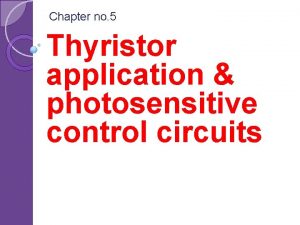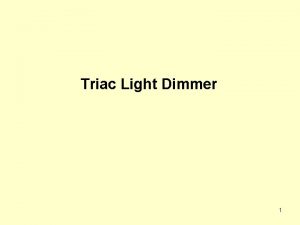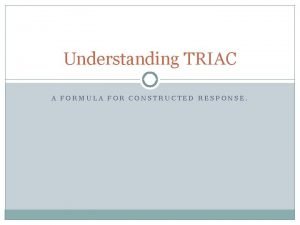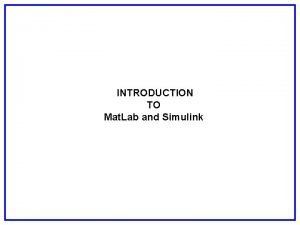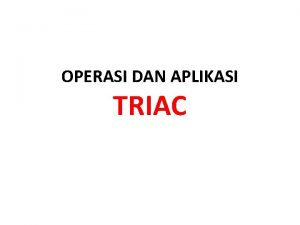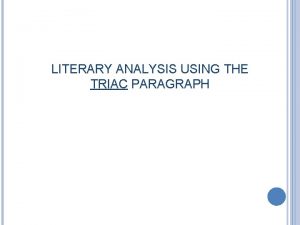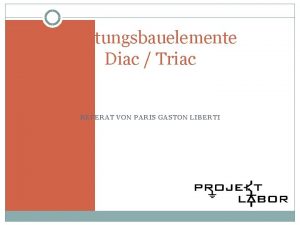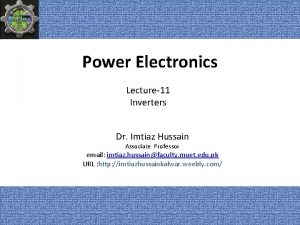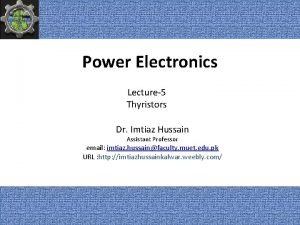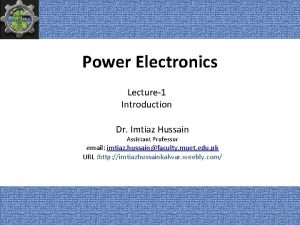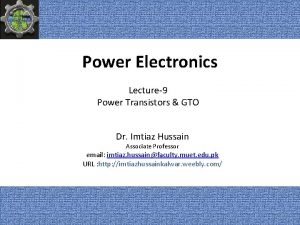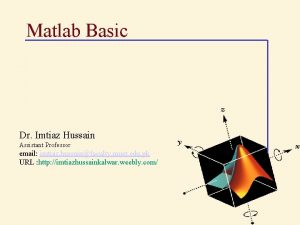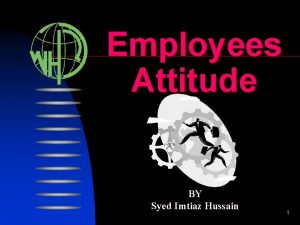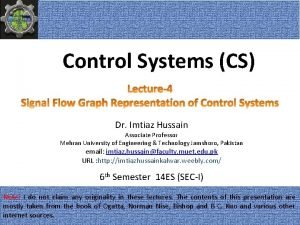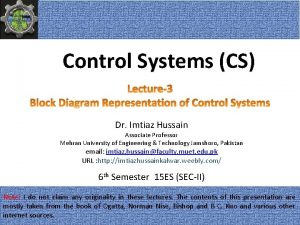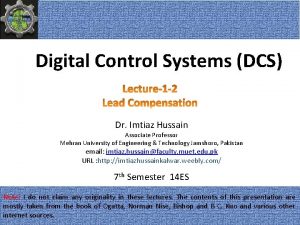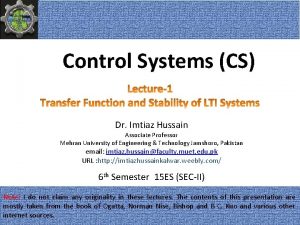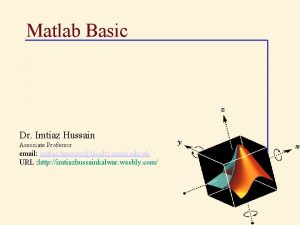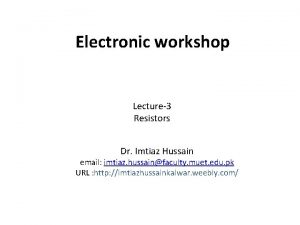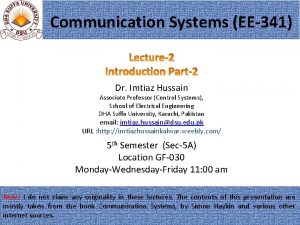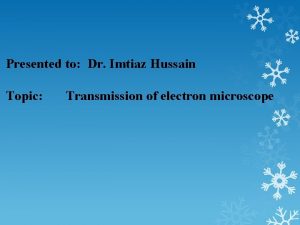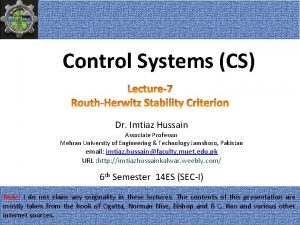Power Electronics Lecture8 TRIAC DIAC Dr Imtiaz Hussain


























- Slides: 26

Power Electronics Lecture-8 TRIAC & DIAC Dr. Imtiaz Hussain Assistant Professor email: imtiaz. hussain@faculty. muet. edu. pk URL : http: //imtiazhussainkalwar. weebly. com/ 1

TRIAC (Triode for Alternating Current) • The major drawback of an SCR is that it can conduct current only in one direction. • In AC systems it is often desirable to control both +ve and –ve half cycles. • For this purpose a TRIAC is used. 2

TRIAC (Triode for Alternating Current) • Triac is a three terminal five layer semiconductor switching device that can control flow of current of an ac load. • Three terminals are designated as Main terminal 1 (MT 1), Main Terminal 2 (MT 2) and Gate (G). 3

TRIAC Packages 4

TRIAC (Triode for Alternating Current) • Following point may be noted about the triac. 1. The triac can conduct current (with proper gate current) regardless of the polarity of the main terminals. 2. A triac can be turned on either with a positive or negative voltage at the gate terminal. 3. Like the SCR once the triac is fired into conduction, the gate lose all control. The triac can be turned off by reducing the circuit current to the value of holding current. 4. The main disadvantage of triacs of SCRs is that triacs have considerably lower current handling capabilities. Most triac are available in ratings of less than 40 A at voltages up to 600 V. 5

Triac Operation 6

Triac Characteristics • V-I characteristics of triac in the 1 st and 3 rd quadrants are essentially identical to those of an SCR in 1 st quadrant. • Triac can be operated with either positive of negative gate control voltage. But in normal operation usually the gate voltage is positive in 1 st quaint and –ve in 3 rd quadrant. 7

Triac Phase Control Circuit 8

Triac Applications High Power Lamp Switch Change over of Transformer Taps 9

Example-1 • 10

Example-1 • Solution a) How will you trigger the triac by only +ve voltage? 11

Example-1 • Solution b) How will you trigger the triac by only -ve voltage? 12

Triac Gate Control Circuits • RC triggering Circuit 13

Triac Gate Control Circuits • Double RC triggering Circuit 14

Triac Gate Control Circuits • Break over device in triggering Circuit 15

Triac Gate Control Circuits • UJT triggering Circuit 16

Triac Gate Control Circuits • UJT triggering Circuit 17

DIAC (Diode for Alternating Current) • A Diac is a two terminal three layer bidirectional device which can be switched from its OFF state to ON state for either polarity of applied voltage. 18

DIAC Packages 19

DIAC Characteristics 20

DIAC Applications • Diacs are used primarily for triggering of triacs. • Some of the circuit applications of diac are – Lamp Dimmer – Heat Control 21

DIAC Applications – Lamp Dimmer 22

DIAC Applications – Heat Control 23

Example-2 • 24

Example-2 • Solution 25

To download this lecture visit http: //imtiazhussainkalwar. weebly. com/ END OF LECTURE-8 26
 Living space imtiaz dharker analysis
Living space imtiaz dharker analysis Imtiaz alam md
Imtiaz alam md Identify how
Identify how Poem tissue
Poem tissue Imtiaz munshi cpa
Imtiaz munshi cpa Bbc bitesize tissue poem
Bbc bitesize tissue poem Living space imtiaz dharker analysis
Living space imtiaz dharker analysis Dr diac
Dr diac Simbol komponen diac
Simbol komponen diac Pendente - omissão de diac
Pendente - omissão de diac Simbologia diac
Simbologia diac Dispositivo semiconductor de 4 capas con 3 terminales
Dispositivo semiconductor de 4 capas con 3 terminales V i characteristics of diac
V i characteristics of diac Scr mas comunes
Scr mas comunes Diac de cuatro capas
Diac de cuatro capas Diacul
Diacul Urrm diode
Urrm diode The real lesson 21
The real lesson 21 Werking triac
Werking triac Gto scr
Gto scr Simbologia ups
Simbologia ups Tiristor simbolo
Tiristor simbolo Triac phase control
Triac phase control Light dimmer triac
Light dimmer triac Triac writing method
Triac writing method Ac voltage control using scr
Ac voltage control using scr Triac simulink
Triac simulink







